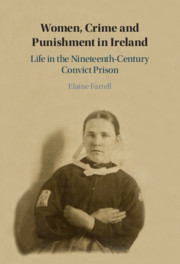Book contents
- Women, Crime and Punishment in Ireland
- Women, Crime and Punishment in Ireland
- Copyright page
- Dedication
- Contents
- Figures, Maps and Tables
- Acknowledgements
- Abbreviations
- Introduction: ‘Another generation of jail-birds’
- Case Study 1 ‘The terrible temptation’
- Case Study 2 ‘A gang of coiners’
- Case Study 3 ‘The workhouse girls’
- Case Study 4 ‘A person of very superior attainments’
- Case Study 5 ‘A most remote part of the country’
- 5 ‘I will be very desolate leaving Prison’
- Conclusion: ‘I think of the time that you and myself ust [used] to be to gether’
- Bibliography
- Index
5 - ‘I will be very desolate leaving Prison’
Liberation
from Case Study 5 - ‘A most remote part of the country’
Published online by Cambridge University Press: 21 September 2020
- Women, Crime and Punishment in Ireland
- Women, Crime and Punishment in Ireland
- Copyright page
- Dedication
- Contents
- Figures, Maps and Tables
- Acknowledgements
- Abbreviations
- Introduction: ‘Another generation of jail-birds’
- Case Study 1 ‘The terrible temptation’
- Case Study 2 ‘A gang of coiners’
- Case Study 3 ‘The workhouse girls’
- Case Study 4 ‘A person of very superior attainments’
- Case Study 5 ‘A most remote part of the country’
- 5 ‘I will be very desolate leaving Prison’
- Conclusion: ‘I think of the time that you and myself ust [used] to be to gether’
- Bibliography
- Index
Summary
Chapter 5 focuses on women’s release from prison using petitions that convicted women or interested parties wrote to lords lieutenant for release from prison or a reduction in sentence, as well as letters that ex-convicts wrote to prison officials in an effort to secure the balance of their gratuities. Women and men directly connected with the prison took an interest in a convict’s plans on departure to maximise her chances of successful rehabilitation and to prevent habitual criminality. The first section outlines the groups and individuals who influenced decisions about a woman’s release. The second and third sections examine how the domestic and employment situations to which an inmate would return could inform her discharge. These two sections document the fates of women after release and the realities of life in nineteenth-century Ireland. The fourth section offers an insight into legislation and practices that developed around convicts and habitual criminals, and the lived experiences for some repeat offenders. The final part of this chapter examines experiences for those women who sought to emigrate. This chapter argues that women’s intentions not to again offend could be thwarted at home or abroad by the challenging circumstances to which they returned.
Keywords
- Type
- Chapter
- Information
- Women, Crime and Punishment in IrelandLife in the Nineteenth-Century Convict Prison, pp. 215 - 254Publisher: Cambridge University PressPrint publication year: 2020



